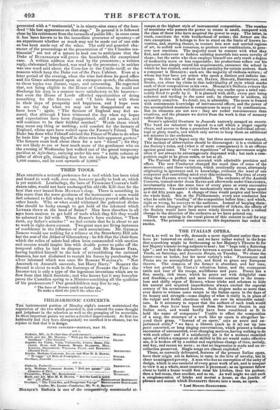PHILHARMONIC CONCERTS.
THE instrumental portion of Monday night's concert maintained the reputation of the two which preceded it, and evinced the same thought and judgthent in the selection as well as the grouping of its materials. i In these important points we notice a decided improvement. At first (so habitually had they been disregarded) we ascribed it to chance, tut we rejoice to find that it is design.
TUTU CONCERT—MONDAY, MAY 16.
ACT r.
Sinfonia. MS., in D (first time of performance) Momuos. Recit. and Air, Mr. MACHIN, " With joy the impatient hus-
bandman" (The Seasons) Mauer. Septetto for Violin. Viola. Violoncello. Contra Basso. Cla-
riooet, Horn, and Bassoon. Messrs. 111..0wpm. Him LINDLIT, DRAOORRITI, WILLIAM.. PLATT, and BAIIILANN,
(Second Pat t) Bzaraovax. Duetto, Madame CARADORI ALLAN. and Miss M. B. Hawse, •• Ti yew" Ratio di Proserpina) WINTER.
Overture, Jerson& SPUHR•
ACT II.
Sinfonia. Pastorale. DAEMON EN.
Aria, Madame CARADORI ALLAN. " Deh per questo" (La Clemens,, di Me) Moz.sar. Concertino, Flute. Mr. BIC.HARDSON NICHOLSON.
Welt. and Air. Miss M. B. Hawn, " But the Lord is mind- ful " (St. Paul) MENDELASOHN BARTHOLDT. Overture, '• The Calm Sea. and Prosperous Voyage" Msaosrssonx BARTHULDY.
Lender. Mr. Loose—Conductor, Mr. W. S. Bi-.srrr NOLTQUE'S Sinfonia is one of the comparatively unsuccessful at- tempts at the highest style of instrumental composition: The number of musicians who possess the power to create is small, compared with the class of those who have acquired the power to copy. The latter, in truth, constitute the wide brotherhood of artists; the former are the rare exceptions. It belongs to few to stand on the limits of known in- vention, and, starting thence, to venture into new and untried regions of art, to unfold new resources, to produce new combinations, to gene- rate new emotions. The majority must be content with what they find, and endeavour to fashion existing materials into some novelty of shape ; but the artist who thus employs himself can only reach a degree of mediocrity more or less respectable; his productions reflect not his character, but simply record his acquirements, announce the school in which be has studied, and evince his partiality for certain authors. Such a composer is MOLIQUE ; such are the majority of sinfonia-writers ; of whom but four have yet arisen who speak a distinct and definite lan- guage. In this walk of their art, HAYDN, MOZART, BEETHOVEN, and SPORE, can alone lay claim to that individuality of style which marks each of their compositions as his own. MOLIQUE'S Sinfonia evinces the acquired power which well-directed study can confer upon a mind emi- nently fitted to profit by it. It is planned with skill ; every part being coherent and tending to the same end; its character is uniform, its symmetry complete. Its detail, too, is admirable. The score is framed with consummate knowledge of instrumental effects, and the power of the accomplished musician is conspicuous in many of its combinations. But its elements are not new : they are rather reminiscences than creations, and the pleasure we derive from the work is that of memory rather than hope.
SPOHR'S splendid Overture to Jessonda narrowly escaped an encore. The band are reluctant to respond to a call which a singer eagerly obeys, and averse to form a precedent from which no individual advan- tage or glory results, and which only serves to keep them an additional i ten minutes in the orchestra.
Of BEETHOVEN'S Septet only the last three movements were played. This method of abbreviation should be discouraged : it is a violation of the Society's rules, and (what is of more consequence) it is an offence against good taste. The " vain repetitions" of long movements might often if not always be advantageously dispensed with ; but such a com- position ought to be given entire, or not at all. The Pastoral Sinfonia was executed with admirable precision and effect. The new Conductor changed the usual time of some of the movements ; and these variations, which continually occur, alternately originating in ignorance and in knowledge, evidence the want of one competent and controlling mind over this orchestra. The time of every thing that HANDEL wrote is established. The orchestra of the Ancient Concerts, trained under Joan BATES and afterwards under GHEATOREE, involuntarily takes the same time of every piece at every successive performance. CRAMER'S violin mechanically starts at the same speed as it did fifty years ago. A change of time would perplex and bewilder the whole band. But at the Philharmonic, every new conductor has what be calls his "reading" of the composition before him ; and which, right or wrong, he conveys to the audience. Instead of busying them- selves about changes in the price and transfer of tickets, the efforts of the Society would have been more wisely directed to such a radical change in the direction of the orchestra as we have pointed out.
There was nothing in the vocal pieces of this concert to call for any remark. The promised amendment in this department has ended in smoke.


























 Previous page
Previous page